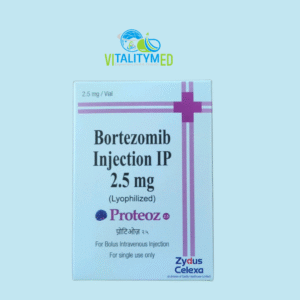Ramiven 150 mg contains abemaciclib, an oral targeted therapy belonging to a class of drugs known as CDK4/6 inhibitors.
It represents a newer generation of anti-cancer agents that focus on blocking specific pathways cancer cells use to grow, offering a more tailored approach than traditional chemotherapy.
Abemaciclib is primarily used in the treatment of hormone receptor positive (HR+), HER2-negative breast cancer, which is the most common subtype of breast cancer.
Taken as an oral tablet, Ramiven has made long-term management of advanced breast cancer more feasible, often improving survival and delaying progression, while allowing patients to maintain daily activities.
Mechanism of Action
Abemaciclib works by precisely targeting the cell cycle machinery that controls how cells grow and divide.
Targeting CDK4 & CDK6
-
Abemaciclib selectively inhibits cyclin-dependent kinases 4 and 6 (CDK4 and CDK6).
-
These enzymes are essential for the transition from the G1 phase to the S phase in the cell cycle — the point at which a cell commits to replicating its DNA and dividing.
Halting tumor growth
-
Many breast cancer cells rely heavily on the CDK4/6 pathway for unchecked growth.
-
By blocking CDK4/6, abemaciclib halts cell cycle progression, effectively stopping cancer cells from multiplying.
Added benefit in hormone receptor positive cancers
-
In HR+ breast cancers, CDK4/6 activity is often driven by estrogen signals.
-
Abemaciclib is frequently combined with hormonal therapies (like letrozole, anastrozole, or fulvestrant) to achieve a synergistic effect, attacking the cancer on two fronts.
Uses
Ramiven (abemaciclib) is approved and commonly used in the treatment of:
Hormone receptor positive (HR+), HER2-negative advanced or metastatic breast cancer
-
In combination with an aromatase inhibitor (such as letrozole or anastrozole) as first-line therapy in postmenopausal women, or
-
In combination with fulvestrant for disease progression following endocrine therapy, or
-
As monotherapy in certain cases where hormonal options are no longer effective.
By slowing cancer cell growth and delaying progression, abemaciclib helps extend survival while preserving quality of life.
Side Effects
While Ramiven is generally better tolerated than traditional chemotherapy (and does not typically cause hair loss to the same extent), it still carries side effects that require close monitoring.
Common side effects
-
Diarrhea: the most frequent side effect, which can sometimes be significant. Patients are advised to take antidiarrheal medication promptly if needed and maintain hydration.
-
Fatigue: can range from mild to moderate.
-
Nausea, decreased appetite.
-
Abdominal pain.
-
Headache.
Effects on blood counts
-
Neutropenia (low white blood cell count), anemia, or low platelets.
-
However, compared to other CDK4/6 inhibitors, abemaciclib tends to cause more gastrointestinal side effects and less severe neutropenia, which may influence choice in individual patients.
Liver and clotting concerns
-
Elevations in liver enzymes (AST/ALT) are monitored with regular blood tests.
-
Rarely, there is an increased risk of blood clots (deep vein thrombosis or pulmonary embolism).
-






